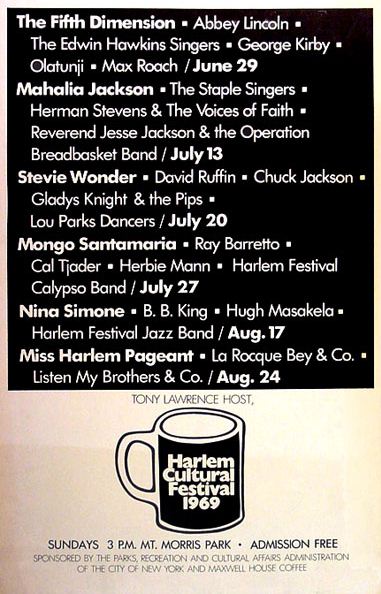 During the summer of 1969, there was a music festival in the state of New York that was not held on Max Yazgur’s farm in Woodstock — the Harlem Cultural Festival, which also became known as the “Black Woodstock.”
During the summer of 1969, there was a music festival in the state of New York that was not held on Max Yazgur’s farm in Woodstock — the Harlem Cultural Festival, which also became known as the “Black Woodstock.”
It was mostly forgotten until 40 hours of videotape of the six-weekend event were discovered in a basement 50 years later. The documentary based on those tapes, “Summer of Soul,” was released in late June in theatres and on Hulu.
If you were in your teens in 1969, you know you want to see this movie. All you have to know is that the heart-thumping rhythms of “Sing a Simple Song,” “Everyday People” and “I Wanna Take You Higher” by Sly and the Family Stone live on stage in concert are prominently featured, and instantly you are transported back to your younger days.
“Summer of Soul” delivers many such cherished moments for most of the two-hour movie. Barring one jarring moment late in the movie, it takes you back to a time when most teenagers thought they would be the generation that would see the end of racial division in America.
“Peace and Love”; “Make Love, Not War”; “Flower Power” and all that.
After all, late Boomers were the first generation of junior and high school students to attend integrated schools in the South. “Surely,” idealistic adult reformers must have thought at the time, “integration will solve all of the problems associated with racism, segregation and oppression for the past 300 years.”

The years leading up to 1969 were filled with strife, anger and civil rights riots. Martin Luther King was assassinated on April 4, 1968. Democratic presidential frontrunner and civil rights advocate Robert F. Kennedy was assassinated on June 5 in Los Angeles. The Vietnam War was in full tilt, and the anti-war movement was in full swing across the country.
Both Woodstock (“I came upon a child of God; he was walking along the road”) and Black Woodstock were designed by their producers to bring people in America together through the power and love of music, not tear them apart. To some extent, both succeeded in their goal.
“Summer of Soul” shows the enormous impact of the church and gospel singing on soul music and black musicians. The Edwin Hawkins Singers mesmerized the audience with their unforgettable rendering of “O Happy Day.” The Staple Sisters followed with “Help Me Jesus.” Gospel legend Mahalia Jackson looks like she is literally singing her heart and soul out of her body with “Take My Hand Precious Lord.”
However, despite seeing and hearing the feel-good vibrations of “My Girl” by a young David Ruffin and “You Heard It Through the Grapevine” by a very young Gladys Knight and her Pips, a fiery arrow comes flying out of the screen late in the movie that makes you think not much had really changed in America after all.
North Carolina native R&B legend Nina Simone took the mic and asked the mostly black audience in Harlem, “Are you ready to kill white people?”
It was stunning. And jarring. And depressing. Her comment brought home the anger many in the black community felt then and still feel now about white people, which was surely the intent of the producers of “Summer of Soul,” since they subtitled it “(Or When the Revolution Could Not Be Televised).”
If any teacher or coach had told innocent young black and white seventh graders in Durham, North Carolina in 1969 that 50 years from then, black and white Americans would still be fighting in the streets over racial issues and innocent people would get killed, those kids would have thought their elders were crazy. We were having too much fun playing football and basketball together and listening to the same songs that wound up being on the soundtrack of our times, “Remember the Titans”, with our black brothers and sisters to think any different.
How could we not be the chosen generation to put racism to death in America forever?
Apparently, we were not. Or maybe we have let our guard down and let others with less scruples and lower base principles take control of the public dialogue and turn it into one of hate based solely on the color of a person’s skin.
The vast majority of American citizens of all races are law-abiding, moral and religious people. We, all of us, black and white seniors now, can’t stay silent and let those who want to divide us by race succeed whether it is in the classroom, in the courtroom or in the streets. We sure can’t stay quiet and accept anyone of any race saying “do you want to kill (black, white, brown) Americans?”
“He taught me how to watch, fight and pray and live rejoicing every day.” Maybe the Lord is just waiting for black and white Christians to come together to fight hatred together wherever it rears its ugly head.
“Time has come today,” as the Chambers Brothers would say.


